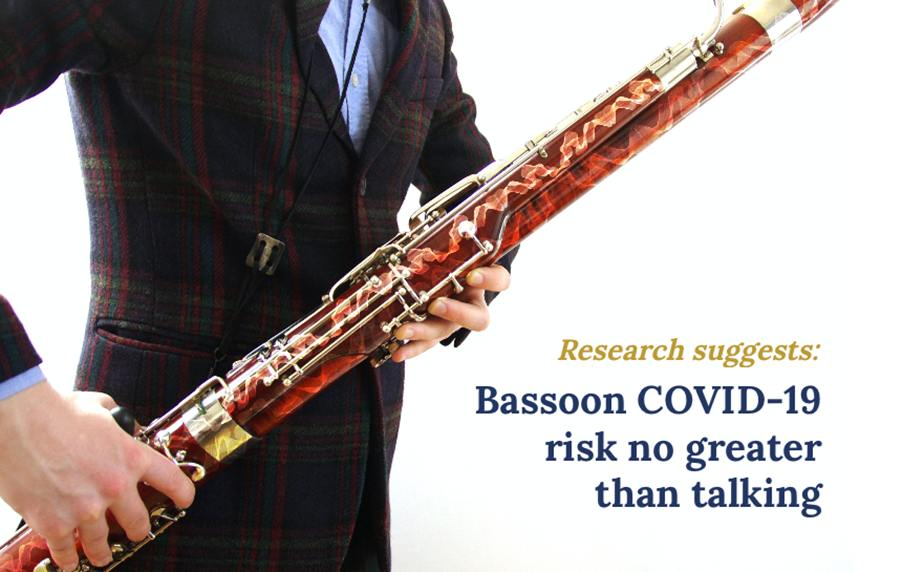Bassoon COVID-19 risk no greater than talking
July 23rd, 2020

Bassoon COVID-19 risk no greater than talking
Article Author: Oliver Ludlow, In-House-Bassoon Specialist and Director at Double Reed Ltd.
Bassoon COVID-19 risk no greater than talking
According to the latest research by the Freiburg Institute for Musicians’ Medicine (FIM), bassoon playing presents no greater risk of spreading the coronavirus than talking.
Droplets and particles
Professors Claudia Spahn and Bernhard Richter’s latest coronavirus risk assessment of playing bassoons, finds that the risk is diminished owing to its length, width and shape, combined with the characteristics of how airborne viruses such as COVID-19 are usually spread; in droplets propelled through the air, and through the aerosolisation of smaller particles which are carried on the air.
Both droplets and aerosolised particles containing the virus, and projected by a musician playing the bassoon, will naturally come into contact with the instrument’s internal bore. In so doing, much of the moisture condenses on the inside, and remains in the bore until it is cleaned out afterwards. This phenomenon, to a certain extent, purifies the air coming out of the instrument.
Although exact measurements of the amount of moisture retained in the air which eventually exits the instrument through its various toneholes are pending, according to the study it is safe to assume that the remaining air poses no greater risk to those in the vicinity than talking. After all, the amount of moisture in the air travelling through the reed, crook, and bassoon itself is being reduced by this process, whereas no such process reduces moisture when talking takes place.
Further, the study suggests the more bends an instrument has, and the longer and narrower the instrument is, the greater the extent to which moisture is removed from the air going through it. The bassoon is certainly one of the longest and narrowest instruments, and it also has a very tight, 180-degree U-bend, and so is naturally well disposed to take advantage of this phenomenon.
The two-metre rule works
In addition, FIM’s research involved measuring the air disturbance at a distance of two metres from the mouthpieces of numerous wind instruments (including the bassoon). They found that no air movement at all could be detected by their sensors at a distance of two metres, and conclude that transmission of the virus through the air at this distance is very unlikely. Interestingly, they conducted the same study with singers, and found that the two-metre distance “can be viewed as a protective distance against droplet infection even with forceful articulation”.
So, it seems that keeping a distance of two metres between musicians is enough to protect against the risk of catching, and spreading, coronavirus through the air. Contracting the virus by touching contaminated surfaces is of course another matter, and so hand-washing is advised at regular intervals.
Cleaning your bassoon after use
The study advises that particular care is taken when cleaning out moisture from bassoons and other instruments after they are played, because as of yet, its infectiousness has not been tested. Taking your bassoon to a separate room or to an outdoor area to swab it out, and taking precautions to prevent moisture from the bore coming into contact with anything other than the swabs you are using, are sensible steps to take. Keeping the swabs contained in a plastic container, and removing them when you get home to allow them to air dry, may also be an easy way to avoid potential contamination of your practice space. Similarly, crooks should be cleaned out thoroughly after use – washing up liquid, water and a crook brush is effective.
For more information on FIM’s research, you can read the full findings of their study here (the section on wind instruments starts on page 25): RISK ASSESSMENT OF A CORONAVIRUS INFECTION IN THE FIELD OF MUSIC
Article Author: Oliver Ludlow, In-House-Bassoon Specialist and Director at Double Reed Ltd.



